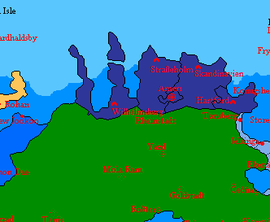Kingdom of Vikland: Difference between revisions
No edit summary |
|||
| Line 3: | Line 3: | ||
== History == | == History == | ||
=== Early History === | |||
Vikland's prehistory begins c. 2,0000 BCE (Before Common Era) with Late [http://en.wikipedia.org/wiki/Palaeolithic Palaeolithic] reindeer-hunting camps of the [http://en.wikipedia.org/wiki/Bromme_culture Bromme culture] at the edge of the ice in what is now the country's northernmost province. This period was characterized by small bands of hunter-gatherer-fishers using flint technology. | |||
The territory of modern Vikland was dominated by these tribes until an expedition of Norse Vikings came in 1950 BCE and by unknown means used the Vikish as slaves to obtain control over the entire region. Once the region was intergrated into what is now [[Normark]] the slaves where also intergrated into the Norse culture and placed at the bottom of its society. Effectivley destroying the tribal culture of the Vikish. | |||
== Politics == | == Politics == | ||
Revision as of 16:23, 3 May 2011
| Kingdom of Vikland Kongeriket Vikland | |||||
| |||||
| Anthem: N/A | |||||
 | |||||
| Official language(s) | Nordic | ||||
| Spoken language(s) | German Spanish Englsih | ||||
| Ethnic groups | Mexican German Polish | ||||
| Demonym | Vikish | ||||
| Capital | Ameri | ||||
| Largest city | Wilhelmsburg | ||||
| Government | Absolute Monarchy | ||||
| King | Vilhelm | ||||
| Legislature | Riksdag | ||||
| Currency | Vikish Krona | ||||
| Formation | |||||
| - Formation | April 17, 2011 | ||||
| Population | |||||
| - Citizens | 7 | ||||
| Footnotes: | This nation is new to Micras. | ||||
Vikland, officially the Kingdom of Vikland, is an absolute monarchy comprising of 4 provinces and 1 government controlled territory. The country is situated in northern Keltia & shares aborder to the south-east with Normark.
History
Early History
Vikland's prehistory begins c. 2,0000 BCE (Before Common Era) with Late Palaeolithic reindeer-hunting camps of the Bromme culture at the edge of the ice in what is now the country's northernmost province. This period was characterized by small bands of hunter-gatherer-fishers using flint technology.
The territory of modern Vikland was dominated by these tribes until an expedition of Norse Vikings came in 1950 BCE and by unknown means used the Vikish as slaves to obtain control over the entire region. Once the region was intergrated into what is now Normark the slaves where also intergrated into the Norse culture and placed at the bottom of its society. Effectivley destroying the tribal culture of the Vikish.
Politics
Foreign relations
Vikland has a policy of de jure and de facto categories, de jure are those who have a treaty with Vikland that requires them to recognize each other, and de facto for those who recognize Vikland without a formal treaty or agreement. The kingdom also takes on a one chance stance on recognition and diplomacy with micronations. Meaning it will recognize all members of the community equally and not view them negatively until it does something that directly affects the nation or its close allies.
| Number | Flag | Nation | Status | Recognised | Unrecognised | Notes |
|---|---|---|---|---|---|---|
| 1 | Normark | Recognise | April 9, 2011 | - | de facto | |
| 2 | Cräiteland | Recognise | April 9, 2011 | - | de facto |
Military
The Viklanden Militære is a government agency reporting to the Vikish Ministry of War and responsible for the peacetime operation of the armed forces of Sweden. The primary task of the agency is to train and maintain the long-term ability to refocus on the defence of Vikland in the event of war. The armed forces are divided into Army, Air Force and Navy.
Political divisions
Links
nac_hos@yahoo.com (Head-of-State)

